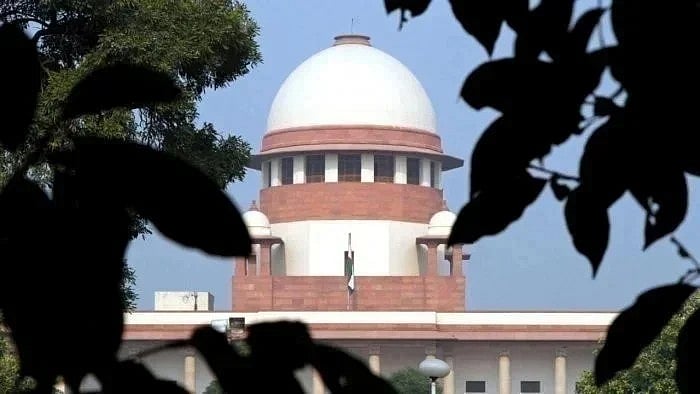
The Supreme Court of India.
Credit: PTI File Photo
New Delhi: The Supreme Court on Monday said scientific procedures, including DNA profile, however advanced, cannot be employed as instruments of speculation; they must be anchored in demonstrable relevance to the charge and justified by compelling investigative need.
"Section 112 of the Evidence Act embodies a legislative policy of profound significance, it stands as a bulwark against the casual illegitimization of children on the strength of unsubstantiated allegations or mere suspicion,'' a bench of Justices Prashant Kumar Mishra and Vipul M Pancholi said.
The court emphasised, the presumption it creates is not a procedural formality to be lightly displaced but a substantive safeguard intended to protect the dignity, social legitimacy, and the legal rights of children born within wedlock.
The court set aside a Madras High Court's direction of May 10, 2017 to a doctor to give blood sample for DNA test for investigation of a cheating FIR lodged by a married woman alleging he was the father of a child, born in 2007 during the subsistence of her marriage with another man.
The bench, however, said, "Forcefully subjecting an individual to DNA testing constitutes a grave intrusion upon privacy and personal liberty. Such an encroachment can be justified only if it satisfies the threefold test of legality, legitimate State aim, and proportionality."
Examining his plea, the bench said, the statutory presumption under Section 112 of the Evidence Act remains unrebutted, and the child continues to be, in the eyes of the law, the legitimate offspring of another man, the husband of the woman-complainant.
The bench declared the High Court’s invocation of Sections 53 and 53A of the Code of Criminal Procedure, rests on a misconstruction of their contextual ambit; these provisions contemplate medical examination only where such an examination may directly yield evidence relating to commission of the alleged offence.
"Absent that nexus, compulsion of a DNA test transforms a lawful investigative power into an intrusive measure devoid of necessity, trenching upon the individual’s bodily autonomy, privacy,'' Justice Mishra wrote in 28-page judgment for the bench.
The court held, the direction for DNA testing, as affirmed by the High Court's division bench, rests upon the fundamental misapprehension of both statutory framework and constitutional safeguards.
It said, the offences alleged, falling under Sections 417 and 420 of the Indian Penal Code, and Section 4(1) of the Tamil Nadu Women Harassment Act, are neither of nature nor of a circumstance that warrant recourse to DNA analysis.
The court noted the woman has not indicated any circumstance even remotely, suggesting that her husband was physically absent during the relevant time when the child could have been conceived. The child's school documents consistently declared her husband to be her father.
"Mere simultaneous access does not negate the husband’s access, nor does it suffice to displace the statutory presumption under Section 112 of the Evidence Act,'' the bench said.
The court found no insufficiency of evidence to dislodge the presumption of legitimacy. The child was born during the subsistence of a valid marriage, it said.
"In the present case, the balance weighs decisively against ordering DNA testing. Such a direction would constitute a significant intrusion into the privacy and dignity of both, the appellant and the child, implicating the fundamental right to privacy guaranteed under Article 21 of the Constitution,'' the bench said.
The court also noted the child is neither a party to the proceedings nor is the child’s status required to be ascertained to determine the commission of the offences alleged. Directing DNA testing in such circumstances would thus be wholly extraneous to the scope of the investigation and disproportionate to the object sought to be achieved, it said.
